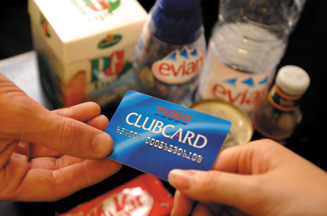
If Tesco's aim was to build a sense of anticipation around the roll-out of its Clubcard 2, it certainly succeeded.
The work sparked financial bloggers' curiosity, which Tesco's refusal to elaborate only increased. On Monday, all was revealed: the retailer will now be offering double points on all products sold in-store and online.
Tesco has earmarked further investment on top of the £150m it pledged when it relaunched the Clubcard, just three months ago. The supermarket chain, which in April recorded a slip in its market share for the first time in 15 years, wants to attract at least 1m additional members to what is already the UK's biggest loyalty scheme. It will be hoping, then, that its competitors are simply unable to match the scale of this offer.
Since May, Clubcard has attracted almost 500,000 additional members, bringing total active membership up to well over 15m. It has achieved this largely through a 'double-up' points offer, which was introduced at the time of the relaunch, but limited, until now, to certain categories.
According to Carolyn Bradley, UK marketing director of Tesco, the decision to extend the existing double-up approach was taken in response to customer feedback. 'Customers have said to us that, although they really love the current [double-up offer], they could do with the extra help across the whole of our shopping trip and not just in some areas,' she says.
Tesco's competitors, particularly its fiercest rival, Asda, will be watching this latest Clubcard offer closely. Malcolm Pinkerton, senior analyst at Verdict Research, believes that the latest phase of Clubcard activity will be good for Tesco, but does not expect to see any significant reaction from the other big supermarkets. 'I wouldn't be surprised if Sainsbury's tries to up the reward points it offers through the Nectar card,' he says. 'In terms of loyalty, there's not much else any of them can do apart from come out with their quality and price message.'
Asda does not operate a loyalty card scheme, choosing instead to focus its investment solely on maintaining low prices. This strategy appears to have paid off so far. Last week the retailer announced that, despite a slowdown in sales growth, it was still attracting a record level of customers. During the last quarter it was pulling in 18m customers every week - the most it has ever done in its 44-year history.
A spokeswoman for Asda was dismissive of Tesco's initiative. 'We've never had a loyalty scheme as we don't feel we need a gimmick to drive customers through the doors and increase market share,' she said. 'Our recent results are testament to this.'
Lisa Thomas, chief executive of direct marketing agency LIDA, which runs the Boots Advantage card scheme, also questions Tesco's card strategy. She warns that loyalty schemes can become a 'drug' where the only way retailers can achieve the same 'hit' is to up the dose.
'There is a danger that the public will become confused by Tesco's messages, there has been constant re-invention,' says Thomas. 'It does smack of desperation. Is it the only way that Tesco is able to get customers spending in a recession?'
Sainsbury's uses the Nectar Card to deliver loyalty rewards to its customers. Other participants in this coalition scheme include Homebase, Amazon and Play.com.
Nectar's managing director, Jan-Pieter Lips, is quick to point out that Tesco's activity highlights the importance of loyalty schemes. 'Tesco using its Club-card as a weapon is a good thing as it educates customers that they can expect more out of their relationship with retailers,' he says. However, he also claims that Nectar has the upper hand. 'With a lot of small loyalty programmes suffering, I think that the efficiencies of coalition will become more important, giving more value to customers,' he adds.
While Tesco is happy to talk about the growth in Clubcard membership, it is not so keen to say how long it will be offering this latest double-points offer. 'We are not putting a timescale on it at the moment,' says Bradley.
Whether it will be here on a permanent basis, or last for a matter of weeks, the activity should not be taken lightly. Coming on top of the multimillion-pound investment announced by Tesco in May, this expansion of its loyalty scheme shows the lengths to which it will go to keep hold of its customers.
Tesco Clubcard
- 13 February 1995 Clubcard launched.
- May 1995 £12m of vouchers sent out to customers. Tesco now sends out more than £100m on each statement date.
- 1996 Points on petrol introduced.
- 1999 'Deals' launched (relaunched in 2004).
- 2004 Christmas Savers launched.
- 2006 Green Clubcard points introduced for carrier bag re-use and recycling.
- May 2009 'Double up' launched on key categories.
- August 2009 Double points offered on all products.
- Since launch, Tesco has awarded its customers more than £3bn-worth of vouchers
- Source: Tesco

